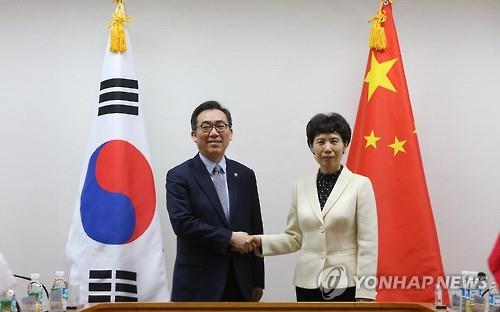- California Assembly OKs highest minimum wage in nation
- S. Korea unveils first graphic cigarette warnings
- US joins with South Korea, Japan in bid to deter North Korea
- LPGA golfer Chun In-gee finally back in action
- S. Korea won’t be top seed in final World Cup qualification round
- US men’s soccer misses 2nd straight Olympics
- US back on track in qualifying with 4-0 win over Guatemala
- High-intensity workout injuries spawn cottage industry
- CDC expands range of Zika mosquitoes into parts of Northeast
- Who knew? ‘The Walking Dead’ is helping families connect
S. Korea, China agree to intensify efforts to maximize FTA effect

Second Vice Foreign Minister Cho Tae-yul (L) shakes hands with Chinese Vice Commerce Minister Gao Yan (R) before their talks at the foreign ministry building in Seoul on April 20, 2016.
SEOUL, April 20 (Yonhap) — South Korea and China agreed to step up efforts to maximize the effect of their bilateral free trade agreement (FTA) and smoothly implement a series of joint economic projects, Seoul’s Foreign Ministry said Wednesday.
The agreement was reached at their annual joint economic committee session held in Seoul. The meeting was led by Second Vice Foreign Minister Cho Tae-yul and Chinese Vice Commerce Minister Gao Yan.
Second Vice Foreign Minister Cho Tae-yul (L) shakes hands with Chinese Vice Commerce Minister Gao Yan (R) before their talks at the foreign ministry building in Seoul on April 20, 2016. (Yonhap)
During the meeting, the two sides discussed ways to capitalize on the bilateral open trade pact to bolster economic cooperation, and foster an optimal environment for bilateral trade and investments, the ministry said.
“In order to maximize the effect of the South Korea-China FTA, the two sides agreed to reinforce efforts to have the FTA enforcement system quickly take root and also to strengthen publicity efforts to enable businesses in both countries to utilize the FTA,” the ministry said in a press release.
The 21st committee session was held for the first time since the bilateral FTA took effect in December. The committee has held its high-level sessions on a regular basis since 1993, a year after the two nations established diplomatic ties.
During the latest session, the two sides also agreed to accelerate efforts to finalize their mid-term vision for bilateral economic cooperation.
Since the end of the last committee session in December 2014, the two governments have been working on drafting a vision to expand the areas of bilateral economic cooperation, which has hitherto focused on the manufacturing sector.
The two sides also agreed to make efforts to ensure that a series of their joint economic projects, which their leaders have agreed to push for during their recent series of summits, would proceed smoothly, the ministry said.
In October when President Park Geun-hye held a summit with Chinese Premier Li Keqiang in Seoul, the two sides agreed to push for a series of economic projects including a joint campaign to advance into a market in a third country.
Also among the projects was one to join together ambitious infrastructure programs already underway in both nations that have the same goals of linking each country with the rest of the world. Seoul’s project is called the Eurasia Initiative, while the Chinese one is called “One Belt One Road.”
The two sides also agreed to work together to address issues arising from nontariff barriers and a set of complaints that entrepreneurs in both nations have raised.
In their opening remarks, Cho painted a picture of a positive outlook for bilateral economic cooperation, underscoring the FTA, which was effectuated in December, that marked a milestone in the two countries’ economic ties.
“With the FTA taking effect last year, the two countries established an institutional framework for comprehensive, stable management (of economic cooperation),” Cho said in his opening remarks. “Based on this achievement, this year should offer a chance for bilateral economic cooperation to be elevated to a higher level.”
The Chinese vice minister said that the bilateral FTA would bring about benefits for both nations.
“With the leaders of the two nations taking interest in the FTA, the two sides have already reduced tariffs twice, leaving a historic mark in bilateral trade relations,” she said. “The FTA will bring in greater benefits for peoples of both nations and will contribute to regional peace and the world economy as well.”
Last year, two-way trade volume was at US$227.3 billion. China is the world’s single largest importer of South Korean goods, accounting for nearly one-fourth of South Korea’s total outbound shipments.












Pingback: Step Up Basis Accounting | Rates for CPA Services for SMB